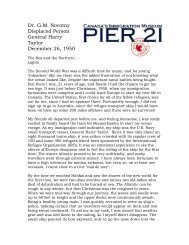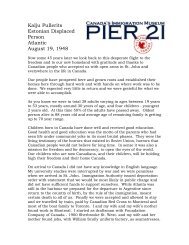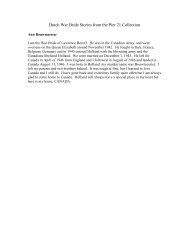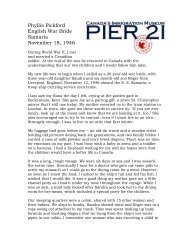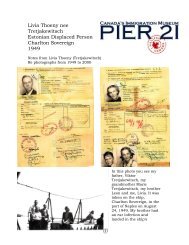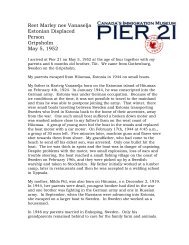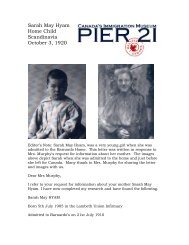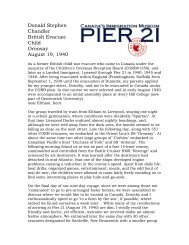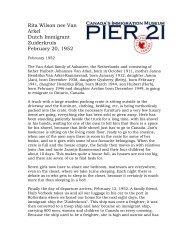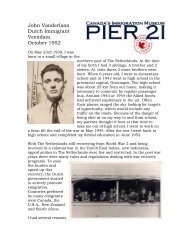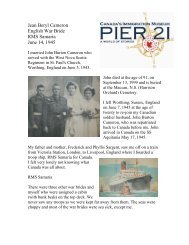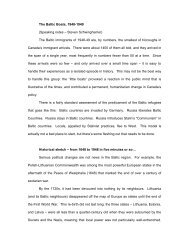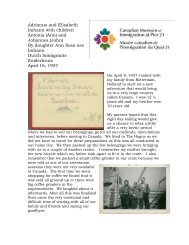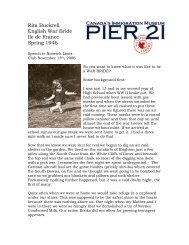Dutch and German Immigrants The Prins Family - Pier 21
Dutch and German Immigrants The Prins Family - Pier 21
Dutch and German Immigrants The Prins Family - Pier 21
You also want an ePaper? Increase the reach of your titles
YUMPU automatically turns print PDFs into web optimized ePapers that Google loves.
Uncle Jack <strong>and</strong> I went to the harbour, we saw the aft <strong>and</strong> the front bowof the boat sticking straight out of the water. <strong>The</strong>y had brought in afloating crane <strong>and</strong> first lifted the front end out of the water. <strong>The</strong>re wereno bodies in there. <strong>The</strong>n they lifted the aft part <strong>and</strong> found nine bodies,but not my dad. He was never found, the only thing they recovered washis jacket. <strong>The</strong> nine men were originally buried in the cemetery on theHavenkade. Aunt Annie Zwart told me that the remains were lifted in theseventies <strong>and</strong> reburied in <strong>German</strong>y.According to Aunt Nel the pastor of our church, pastor Moleman, at firstrefused to have a memorial service for my dad because he never attendedchurch services. Opa <strong>Prins</strong> must have written to the bishop to request aservice <strong>and</strong> this service was held in the Good Shepherd church where theAnglicans were temporarily worshipping. After the initial refusal Opa<strong>Prins</strong> must have said, "If there is no service for my son you will never seeme or my family in this church again".Because my dad was missing <strong>and</strong> his remains were never found, he wasofficially declared deceased five years later. Even now, when I am inIJmuiden <strong>and</strong> walk by the Haringhaven, I am still reminded of whathappened during those December days in 1944.It must have been March or April of 1945, when, by prior agreementbetween the occuping <strong>German</strong> forces <strong>and</strong> the Allies, planes came over<strong>and</strong> dropped supplies for us at pre-designated fields, food as flour <strong>and</strong>dried eggs. This food was supplied by the Swedish Red Cross. <strong>The</strong> prioragreement was necessary, so that the planes would not be fired on by the<strong>German</strong>s. It must have been one of these flights, when they flew at lowaltitude over my hometown. Being an agile boy of fifteen years I wassitting on top of our roof, watching them fly over, the planes being lowenough to see some of the personnel in their Plexiglas enclosures, wavingat him <strong>and</strong> he waving back at me.(Photo) <strong>The</strong> Quay, where we watched5. 1945 - 1955Years After the WarAfter the war, life slowly returned to normal. We were liberated by theCanadians. When they entered the town with their jeeps <strong>and</strong> other warmaterial there was no comparison between the reception they received<strong>and</strong> the <strong>German</strong>s in 1940. <strong>The</strong> Canadians of course were quite popularwith the <strong>Dutch</strong> citizens, especially their evening parade, jeeps, cigarettes<strong>and</strong> chocolate. When my sister Anneke tasted chocolate for the first timeshe asked me what it was!



